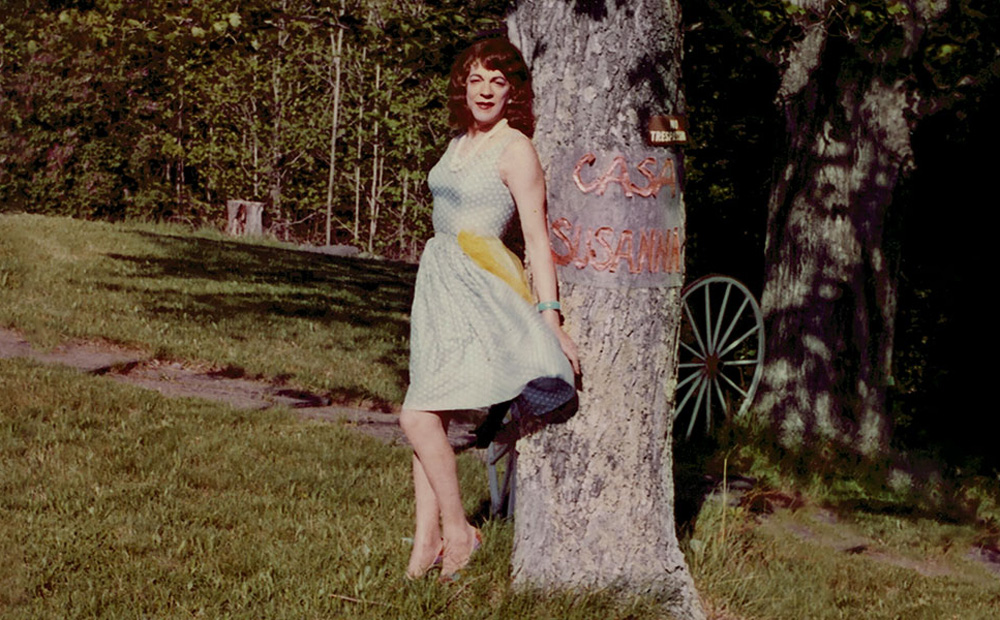It’s a small but meaningful gesture on the part of “Casa Susanna” director Sebastian Lifshitz that the subjects aren’t interviewed in some static abstract space as most who participate in docs are, but instead filmed as part of the world with life unfolding behind them occupying the center of the screen. It is in stark contrast to the testimony they give about the days when they had to escape to the Catskills to feel like themselves in the ‘50s and ‘60s, joyously recalling the time spent at the retreat where men who felt more comfortable dressing as women could roam freely without fear of being judged. An ad in the back pages of a quietly circulated magazine brought in visitors from around the world and although largely invisible to the world at large as a means of protection, someone had the forethought to preserve the memories in photographs, a tranche of which was uncovered at the turn of the century and now feels especially poignant as irrefutable evidence that transgender men and women existed in a culture where even now some still refuse to believe they do.
It would be powerful enough if only Lifshiftz were to present still portraits of the film’s central subjects Katie and Diana, both looking regal in their eighties when you can only imagine what they survived to get here, but their recollections, as well as those of Betsy, the daughter of a science-fiction writer who would hide his own getaways to Camp Susanna by sending her to summer camp, form a deeply moving celebration of the oasis to be found in Jewett, New York where Marie Tonell, a wigmaker in the city, and Tito Arriagada, a radio host who would marry Marie and transition into Susanna, had set up a club for female impersonator shows every Saturday night. Only Gregory, Marie’s grandson, has memories of how the club was established and they’re vague when he was of preschool age when the club was at its height, yet what is unforgettable to all is how the place made them feel with Gregory shaped for life by Marie’s acceptance of Susanna, and Katie and Diana’s lives changed by the knowledge that there were others out there like them, hailing from rural areas in Australia and Indiana, respectively.
The film obliges all of them to return to where Casa Susanna once stood, and although little remains physically, it nonetheless comes alive brilliantly when Katie and Diana speak about it in the greater scheme of their lives, a respite where they could feel whole even if it was for just one weekend a year. Betsy, who was left largely to imagine what transpired when she only discovered after her father’s death that he had published a memoir of the time he spent upstate under a pseudonym, is happy to know there were times when he was, describing the self-hatred he could project onto others as a result of not being allowed to be open, and Lifshitz gently allows for the small bits of sustenance that all could hold onto in their mind to make sense of how they endured the pain that came with having to maintain a secret identity or the rejection they faced after they transitioned.
However, in “Casa Susanna,” any sense of isolation or alienation is transformed into solitude, exuding the inner peace its subjects have found and in effect, reopens the doors to the peaceful retreat that Maria and Susanna likely always envisioned. Thanks to cinematic immortality, it’s no small gift that those doors will always be open.
“Casa Susanna” will screen at the Venice Film Festival in the Giornate Degli Autori section on September 5th at 4:30 pm at the Cinema Rossini at the Cinema Candiani. It will also screen at the Toronto Film Festival on September 9th at 9:15 pm, September 10th at 3:10 pm and September 16th at 10 am at the Scotiabank. It will also be available throughout Canada virtually beginning September 13th through the end of TIFF.




